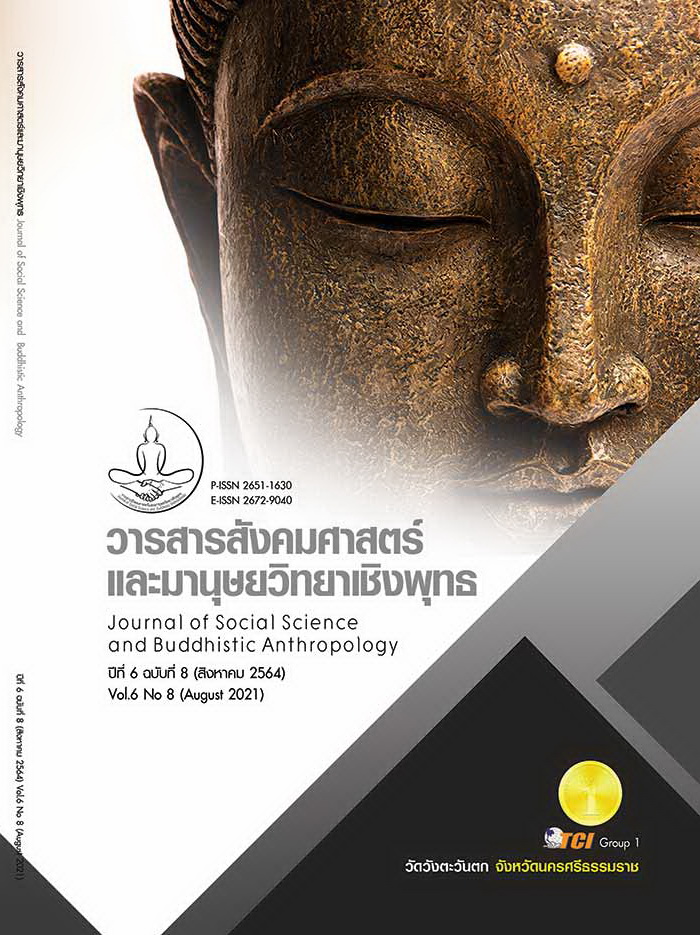PREDICTING FACTORS OF HEALTH PROMOTING BEHAVIORS AMONG WORKING-AGE ADULT WITH METABOLIC SYNDROME
Keywords:
Health Promoting Behaviors, Metabolic Syndrome, Working - Age AdultsAbstract
The Objectives of this research article were to study which aimed to examine the predictability of perceived benefits of behaviors, perceived barriers to health promoting behaviors, perceived self-efficacy, and interpersonal influence in health-promoting behaviors among working - age persons with metabolic syndrome. The sample was 103 adults with metabolic syndrome aged 20 to 59 from Moo 6,7 Bang - Chalong Sub District, Bangplee District, Samutprakarn Province. They were selected by using the Krejcie and Morgan table by purposive sampling technique. The research instruments used to collect data were questionnaires which consisted of 1) general information 2) health -promoting behaviors in working - age adults 3) perceived benefits 4) perceived barriers 5) perceived self-efficacy and 6) interpersonal influence. The questionnaires were proved for content validities by three experts index of item objective congruence: IOC resulting in .86 and were tested for reliability by using Cronbach’s alpha coefficient in part 2 - 6 resulting in 0.73, 0.80, 0.82, 0.79, and 0.86 respectively. General data were analyzed by using descriptive statistics. Pearson’s product moment correlation coefficient and multiple regressions were used to analyze the relations and the predictive power. The results revealed that: the mean score in total part of health-promoting behaviors in working-age adults was at a moderate level ( = 3.15, S.D. = 1.01). perceived benefits of behaviors, perceived barriers to health promoting behaviors, perceived self-efficacy, and interpersonal influence had significant impact on health-promoting behaviors among working-age adults with metabolic syndrome. The variables accounted for 45.7% (R2 = .457, p < .001) of total variance in the health - promoting behaviors. The findings could be used as base knowledge for tailoring health - promoting interventions in working - age adults with metabolic syndrome.
References
กรมอนามัย. (2559). รายงานประจำปีกรมอนามัย 2559. นนทบุรี: กรมอนามัย กระทรวงสาธารณสุข.
โครงการสุขภาพคนไทย. (2562). สุขภาพคนไทย 2562. นครปฐม: สถาบันวิจัยประชากรและสังคม มหาวิทยาลัยมหิดล.
นพณัฐ จำปาเทศ และคณะ. (2561). ปัจจัยที่มีความสัมพันธ์กับพฤติกรรมป้องกันโรคหลอดเลือดหัวใจของผู้ที่มีภาวะเมตาบอลิกซินโดรม. วารสาร มฉก. วิชาการ, 22(43), 114-129.
ปริศนา อัครธนพล และคณะ. (2561). ภาวะสุขภาพ และพฤติกรรมสร้างเสริมสุขภาพของพนักงานลูกจ้างรายวันในมหาวิทยาลัย. วารสารพยาบาล, 67(4), 11-20.
ยุภา โพผา และคณะ. (2559). ปัจจัยทำนายพฤติกรรมสุขภาพผู้ที่มีภาวะไขมันในเลือดผิดปกติที่ไม่สามารถควบคุมได้. วารสารพยาบาลทหารบก, 16(1), 123-130.
ละอองดาว คำชาตา และคณะ. (2561). โรคอ้วนลงพุง: สัญญาณอันตรายที่ต้องจัดการ. ศรีนครินทร์เวชสาร, 33(4), 386-395.
สำนักโรคไม่ติดต่อ กรมควบคุมโรค กระทรวงสาธารณสุข. (2560). แผนยุทธศาสตร์การป้องกันและควบคุมโรคไม่ติดต่อระดับชาติ 5 ปี. กรุงเทพมหานคร: อิโมชั่น อาร์ต จำกัด.
Aekplakorn, W. et al. (2018). Prevalence of diabetes and relationship with socioeconomic status in the Thai population: National health examination survey, 2004 - 2014. Journal of Diabetes Research, 8(1), 1-8.
Araya, K. et al. (2018). Relation between alcohol consumption and prevalence of metabolic syndrome in the Chilean population according to data from the 2009 – 2010 national health survey. AtherosclerosisSupplements, 32(1), 83-85.
Blackford, K. et al. (2016). Effects of a home-based intervention on diet and physical activity behaviours for rural adults with or at risk of metabolic syndrome: A randomised controlled trial. International Journal of Behavioral Nutrition and Physical Activity, 13(1), 1-10.
International Diabetes Federation. (2009). The IDF consensus worldwide definition of the metabolic syndrome. Belgium: International Diabetes Federation.
Krejcie, R. V. & Morgan, D. W. (1970). Determining Sample Size for Research Activities. Educational and Psychological Measurement, 30(3), 607-610.
Lo, S. W. et al. (2015). Factors associated with health-promoting behavior of people with or at high risk of metabolic syndrome: Based on the health belief model. Applied Nursing Research, 28(2), 197-201.
Papier, K. et al. (2017). Social demography of transitional dietary patterns in Thailand: Prospective evidence from the Thai cohort study. Nu trients, 9(11), 1173-1178.
Pender, N. J. et al. (2011). Health promotion in nursing Practice 6th ed. Boston: Pearson.
Supruang, J. et al. (2020). A Qualitative Study of Perceptions about Eating Behaviours and Metabolic Syndrome in Thailand. Pacific Rim International Journal of Nursing Research, 24(2), 234-245.
Wijesinghe, N. (2018). Metabolic syndrome among south Asians. Journal of the Ceylon College of Physicians, 49(2), 45-48.
World Health Organization. (2018). Prevention of Cardiovascular Disease: guideline For Assessment and Management of total Cardiovascular risk. Geneva: World Health Organization.









